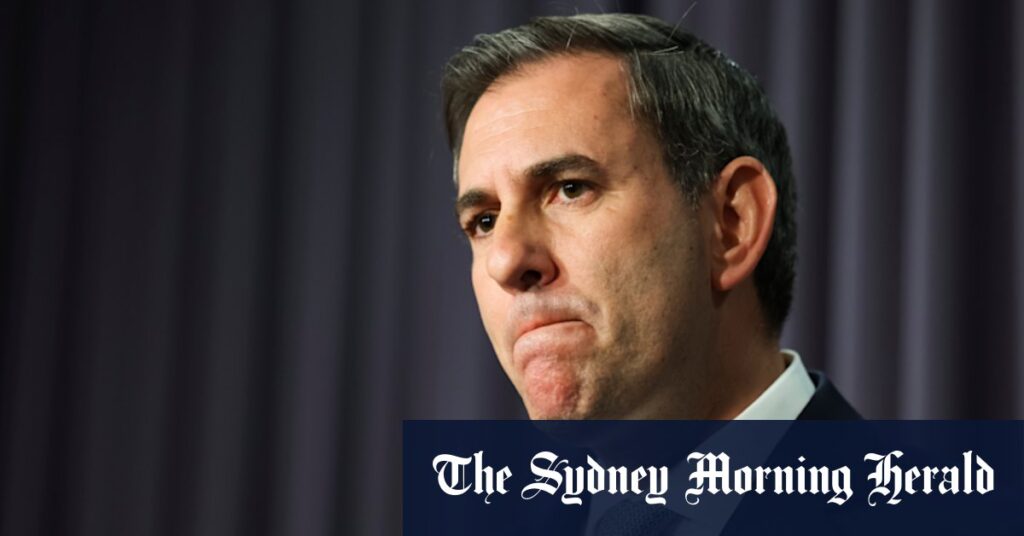
Months of mounting internal pressure, including from Labor legend Paul Keating, have compelled Treasurer Jim Chalmers to overhaul his plans to increase taxes on the superannuation accounts of wealthy Australians. This move sets up a potential clash with the Greens in the Senate.
After consistently resisting suggestions to radically alter his 2023 budget announcement, Chalmers revealed on Monday that the government will establish a 40 percent tax rate for earnings on super balances above $10 million. Earnings on balances above $3 million will be taxed at 30 percent. Plans to tax unrealised gains at 30 percent have been abandoned, along with the decision not to index the $3 million threshold with inflation or wages growth.
The low-income super tax offset (LISTO) payment will also see an increase from $500 to $810. Currently, those earning under $37,000 annually receive $500 from the government, deposited directly into their super account. From 2027, this threshold will rise to an income of $45,000, with the annual deposit increasing to $810.
Background and Political Dynamics
The announcement followed news that Prime Minister Anthony Albanese had requested a Treasury briefing on objections to the original super tax changes. At a meeting of the Expenditure Review Committee on Friday, Chalmers and Albanese agreed to the changes, which were then approved by the cabinet on Monday morning.
Chalmers stated that the changes aim to create a fairer superannuation system, reflecting a period of consultation. “We always try and find the best way through. We always try and work through issues in a considered and methodical way. And that’s what’s happened here. We found another way to satisfy the same objectives,” Chalmers said.
“It means a fairer superannuation system from top to bottom. It means better outcomes for people on the lowest incomes and better-targeted concessions for people with the biggest balances. And that’s a good outcome from our point of view.”
The changes were initially announced in early 2023, with Chalmers describing them as a “modest” reform to ensure the long-term sustainability of superannuation. The Treasury estimates that the government will forego more than $55 billion in revenue due to the concessional tax treatment of super.
Expert Opinions and Historical Context
The changes have faced increasing criticism, with claims that taxing unrealised gains would create significant compliance issues and harm investment in sectors from venture capital to farming. The lack of indexation was also seen as a potential burden on average-income earners.
Paul Keating, who played a pivotal role in the creation of modern superannuation, argued that the issues Chalmers sought to address originated from changes made by John Howard and Peter Costello in 2007, when they abolished the “reasonable benefits test.”
“Bringing equity and an important measure of tax justice to super’s current runaway arrangements with the nomination of a $3 million limit taxed at 15 percent and 30 percent thereafter, is a huge policy achievement by the Treasurer, as is the added increment of a higher rate of tax on accumulations above $10 million,” Keating said.
Keating emphasized that the reform shares substance with necessity, a necessity overlooked by successive governments since 2007.
Implications and Future Steps
The revised plan will significantly reduce the expected tax revenue. Chalmers noted that in its first full year of operation, now delayed to the start of the 2026-27 financial year, the changes will raise about $2 billion compared to the $2.5 billion anticipated from the original package.
Shadow Treasurer Ted O’Brien criticized the proposal as “super big and super bad,” demanding Chalmers explain how he would cover the expected $4 billion shortfall in revenue.
Independent MP Allegra Spender acknowledged the strong support for reducing superannuation concessions but noted that the original proposal, particularly the taxation of unrealised gains and lack of threshold indexation, had gone too far. “I believe super concessions should focus on supporting a dignified retirement and while I will be looking carefully at the details of what’s actually proposed, the packaged changes as announced today appear to be a reasonable compromise,” she said.
The government hopes to legislate the proposals early next year, requiring the support of the Greens to pass the reforms through the Senate. Greens economic justice spokesman Nick McKim accused the government of diluting its changes to appease the wealthiest Australians, arguing the reforms would cost the budget billions in foregone revenue.
“This is a capitulation to the wealthiest people in the country, and a slap in the face to everyone else who pays their tax straight out of their pay packet,” McKim said.
Superannuation lead for CPA Australia, Richard Webb, urged Parliament to pass the proposals, praising the move to index the thresholds. “Bracket creep already has a silent eroding effect on personal finances. Allowing further erosion of superannuation savings would have been contrary to the fundamental principles of our tax system,” he said.
Mary Delahunty, chief executive of the Association of Superannuation Funds of Australia, warned that the changes would create “extra work” for Australia’s super funds but welcomed the reforms.
As the government prepares to navigate the legislative process, the debate over superannuation tax reforms underscores the complex interplay of fiscal policy, equity, and political strategy in shaping Australia’s economic landscape.





